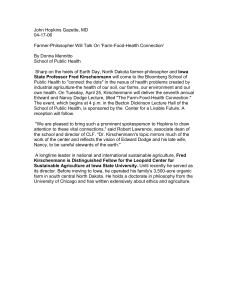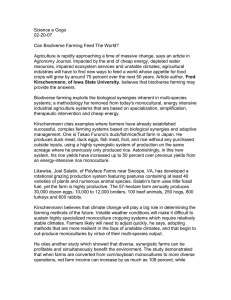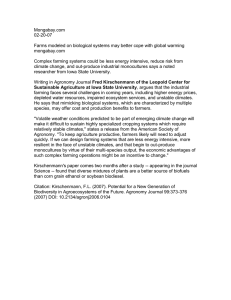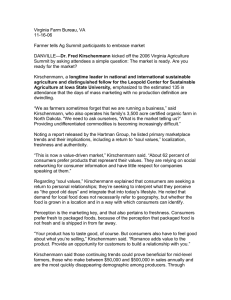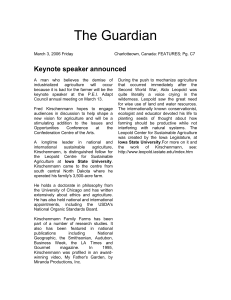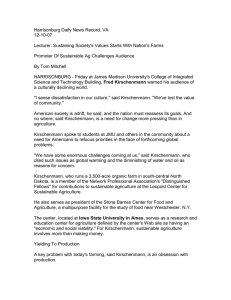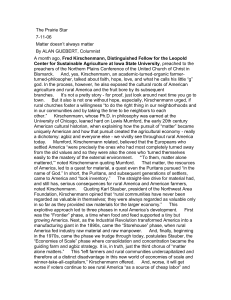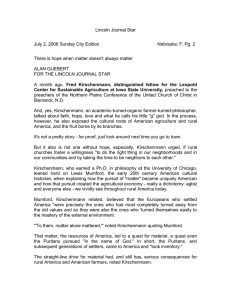Barre Montpelier Argus, VT 04-27-06
advertisement
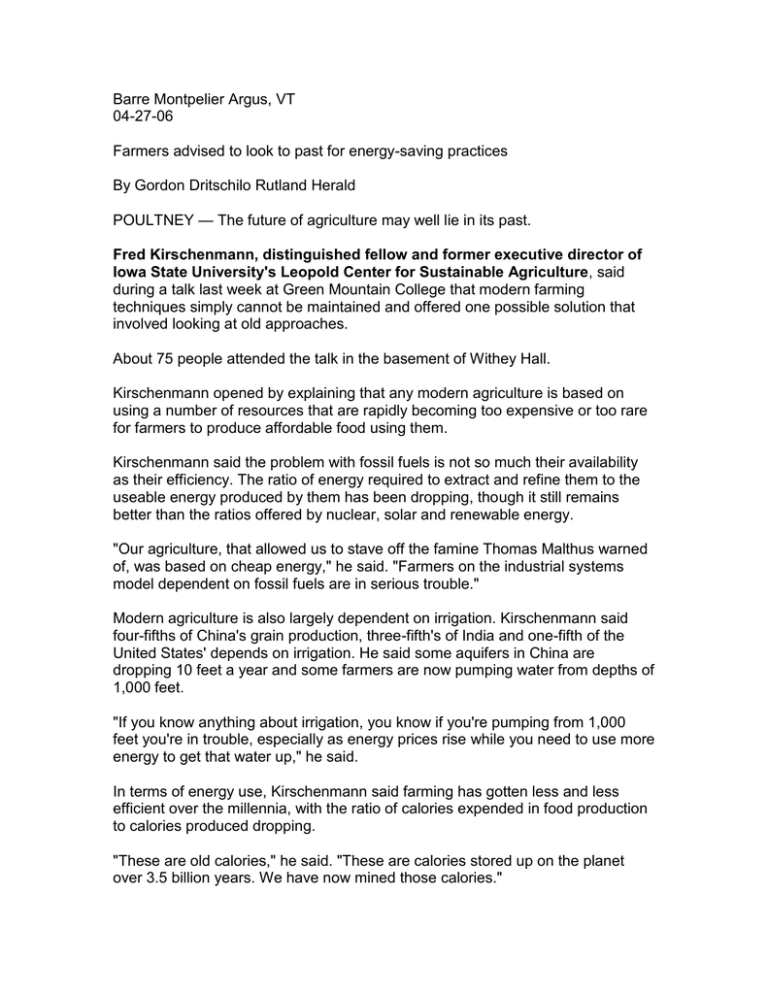
Barre Montpelier Argus, VT 04-27-06 Farmers advised to look to past for energy-saving practices By Gordon Dritschilo Rutland Herald POULTNEY — The future of agriculture may well lie in its past. Fred Kirschenmann, distinguished fellow and former executive director of Iowa State University's Leopold Center for Sustainable Agriculture, said during a talk last week at Green Mountain College that modern farming techniques simply cannot be maintained and offered one possible solution that involved looking at old approaches. About 75 people attended the talk in the basement of Withey Hall. Kirschenmann opened by explaining that any modern agriculture is based on using a number of resources that are rapidly becoming too expensive or too rare for farmers to produce affordable food using them. Kirschenmann said the problem with fossil fuels is not so much their availability as their efficiency. The ratio of energy required to extract and refine them to the useable energy produced by them has been dropping, though it still remains better than the ratios offered by nuclear, solar and renewable energy. "Our agriculture, that allowed us to stave off the famine Thomas Malthus warned of, was based on cheap energy," he said. "Farmers on the industrial systems model dependent on fossil fuels are in serious trouble." Modern agriculture is also largely dependent on irrigation. Kirschenmann said four-fifths of China's grain production, three-fifth's of India and one-fifth of the United States' depends on irrigation. He said some aquifers in China are dropping 10 feet a year and some farmers are now pumping water from depths of 1,000 feet. "If you know anything about irrigation, you know if you're pumping from 1,000 feet you're in trouble, especially as energy prices rise while you need to use more energy to get that water up," he said. In terms of energy use, Kirschenmann said farming has gotten less and less efficient over the millennia, with the ratio of calories expended in food production to calories produced dropping. "These are old calories," he said. "These are calories stored up on the planet over 3.5 billion years. We have now mined those calories." Another part of the problem, Kirschenmann said, is the prevalent cultural belief that technology will solve all problems. "That is a fool's errand, in my opinion," he said. Nonetheless, Kirschenmann said there are people developing techniques that could help sustain agriculture well into the future. These approaches involve paying closer attention to how plants and animals interact in the ecosystem and better harnessing those interactions in agriculture. As an example, he pointed to a Japanese rice farmer named Takao Furuno, author of a book titled "The Power of Duck." Until 1987, Kirschenmann said Furuno was a typical industrial farmer, growing a single strain of rice using fertilizers and pesticides. "Every year, everything he earned on his farm he had to reinvest to plant the next year's crop," Kirschenmann said. Realizing he could not carry on in such a manner, Furuno began looking into old Japanese farming practices that could be improved with modern practices. Observing that ducks were once a common sight in Japanese rice paddies, Furuno fenced in some ducks in one of his. He found that they ate a number of insects. He soon bred ducks that ate not only insects but also snails that attacked the roots of rice plants. With 200 ducks per hectare of land, he found he no longer needed pesticides. Furuno then tried restoring the fish that once lived in rice paddies. They joined with the ducks in eating a weed that could overgrow rice paddies, eliminating the need for herbicide. With small numbers of the weeds surviving, Furuno found that they had a bacteria that produced nitrogen. The nitrogen mixed with droppings from the fish and ducks to create natural fertilizer. Furuno's rice yields went up from 20 to 50 percent. In addition to rice, Furuno now had revenue from duck meat, duck eggs and fish meat. The lack of pesticides also meant he was able to plant fruit trees around his rice paddies, according to Kirschenmann. "Here is a farming operation that has dramatically increased productivity while at the same time decreased input costs," he said. "If this is a system that can work in Japan, what can work in the ecosystems of California or Vermont? The stark answer is we don't know because we haven't looked into out ecosystems that closely." At least, not yet. Kirschenmann said there are studies under way that seem to indicate there are similar approaches to farming that can work in the United States. Contact Gordon Dritschilo at gordon.dritschilo@rutlandherald.com.
